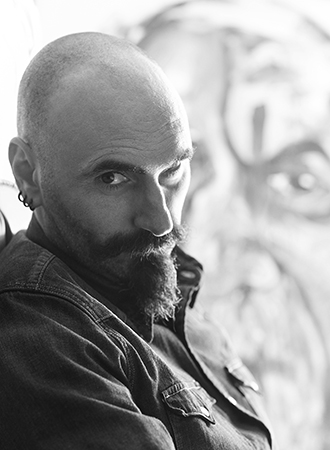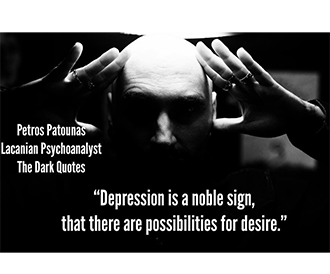An analysis which does not invoke the faith of the Act of life, is an empty speech- it is a cenotaph, unoccupied by the equi-vocal carcass, to be there, accordingly that the subject testifies that he does not belong to the flesh of that speaking corpse: that is how a resurrection ought to occur: this is to be explained as a crisis in psychoanalysis, nothing else: for there cannot be a crisis in psychoanalysis yet there can be a crisis with the psychoanalysts- one ought to love moments of crisis, be those of an imaginary order, for, it is those crises that will enable the breathing space and responsibility of the subject’s Act in support of the emerging of the Έργον.
And, to murmur delicately a word to the theologian, himself the leader of murmurers and devout to the lettering of the oral object but not to the letter, he who masticates his phonemes acclimating of a desire that not much can be said about because he knows not what he is doing, and a Real who is beyond signification but not beyond an orientation because the Real is the Ethic, yes, beyond vocalizations but not beyond the Act: he who forsakes the act necessary for the living- for, he cannot see desire but as an empty Nothing: it is his own species, creatures of death and not subjects of life who have intellectualised psychoanalysis into a discourse subtracting the body of the world, castrating castration itself and never uttering at least, that, that the object of desire is the Breath, itself not materialised with the phallus’ measurements, itself not a fantasy whose ways depict the structure but the Παρουσία of the Παράκλητος, the Holy Breath sectored at the voice of the subject who ligaments his body not, not, not with Knots but with the draught of the Phoneme’s emission of intonations, sententious to the ears of he who has had a perspicacity of Death; and the Dream, that which Freud has given us with himself as the Double of his double, as the mirror testifies for the double raised on the square power, and where he pays his regards to the passage of miserable comforters of life, who are a misadventure in creating the emptiness of space of a spirit, lenders of an imaginary discourse to cure only to exterminate the subject, not so much from his signifiers but from the utilisation of an Act: the knowledge here is not of the I know nothing but of the I know so I assume the responsibility of the praxis because in the Real the Letters disappear where there is the Breath: transliteration, that which has been explain as a Μεταγραφή, not a metalanguage but a transliteration, and, for that to occur, so that Lunguage would emerge, the psychoanalysts’ punctuation ought to be at the level of a rough breathing perpendicular- such the Act functions on the graph of desire and the inconsistency of jouissance and desire- to what has been a primary vowel or diphthong: one does have the responsibility to hear not only the holophrastic adventures of the signifiers but those of the letter too.
And from this consistency of the act and desire- one not representing another, an one that is not repeated- and their adhesiveness to the Kinesis of their ethic, the Έργον emerges into the world, not the scene, without the φ and a desire functioning as a pulsation and a lighthouse in the Pangaea of the Apeiron to enrich the shadow of the object; and, though it is perpendicular and breezes in from atop the graph of desire, it is of the earth, for, there is no Other foundational speech other than the I desire and therefore I Act: it is when in Kinesis: that is the Έργον as there cannot be any one thing more metaphysical that the Ethic of Life nominated as the Freudian Ascetic experience of psychoanalysis: the ΠαρΟυσία of the Παράκλητος, who is said to be absent from the sessions and it is him precisely that one may invoke within the session’s Real time, for, and because, of this presence the subject proceeds to his Act- he who has never been called by psychoanalysts because they are bound to the pseudo-ethical dimension of a deontology of their aphasic apraxia, and for that reason, they, either cannot speak to the world, or, they, they as they say, speak onto an imaginary platform of knowledge and thus reducing the real experience into a complicated intellectualism, a new version of a phallic position as they cannot move; an analysis which does not invoke the faith of the Act is an empty speech: as long as a full speech reveals its chasm and lack because of the presence of the Act- the fifth constituent by which analysts endear the object and not the discourse, because that which cannot be said is an Act: one may not identify that with a doing and neither refer it as knowledge, certainly not that psychoanalysts are doomed to evaporate as soon as the figure of speech of a given analysand shows to them that one may not position his arrangement according to the coordination of a structure’s Antinomination, especially when it comes to the specificity of the Act.
The Έργον speaks: I desire, therefore I Act– a foreshadowing of a speech, which is the Lunguage of the Act: here is manifested a cool heavenly gentle wind, the Breath, a good use of the gap’s emptiness: beyond the structure the barrenness itemize the Act, which is not One so it cannot be repeated- there is no incompatibility between desire and Act: and the vocative case of Desire is life itself- for, further than the agony of lack accompanying the empty amplitudes of an architectural configuration, the actual traumatic experience of knowing what to do with the Real is the responsibility of one’s Act, the Άγών, an uncontaminated manifestation of Freud’s to love and to work, only that, as said before, and as far as life is concerned, no psychoanalyst has ever been a athletics’ legend; because he who is the carrier of the Act confronts the chorus of the linearity of desire and jouissance and ought to descend from the exceeding shield of the Death Drive, from the gap of the Breath, only to be digested into another gap: such is the practice of the Letters- too feminine for he who does not exchange the Phallus for the saving of his soul: and, if the Gods of sentence structures are departed and the subject has misplaced its devotion to what has been aphoristic at the level of a jouissance that eventually emerged as a Name of the Father, a star of Bethlehem leading the magicians to their destination where it has been marked that Out of Egypt I called my Son, this subject ought then to know how to synthesise a hymn with the pieces of its fragmented body, to sustain itself at the level of the praxis- a praxis is when “I represent and embody the Act,” and it is a ΠαρΟυσία: the real castration is the castration of the Ethic that orients the Bethlehem’s star itself, and from the fundamental fantasy one has the passage of honesty to the uninterrupted Fundamental Act: this is the prayer of psychoanalysts, alienated only by its chain of Acts, and the only true Verleugnung is that which blinds the subject from the hollow Αἰθήρ of this Act.

